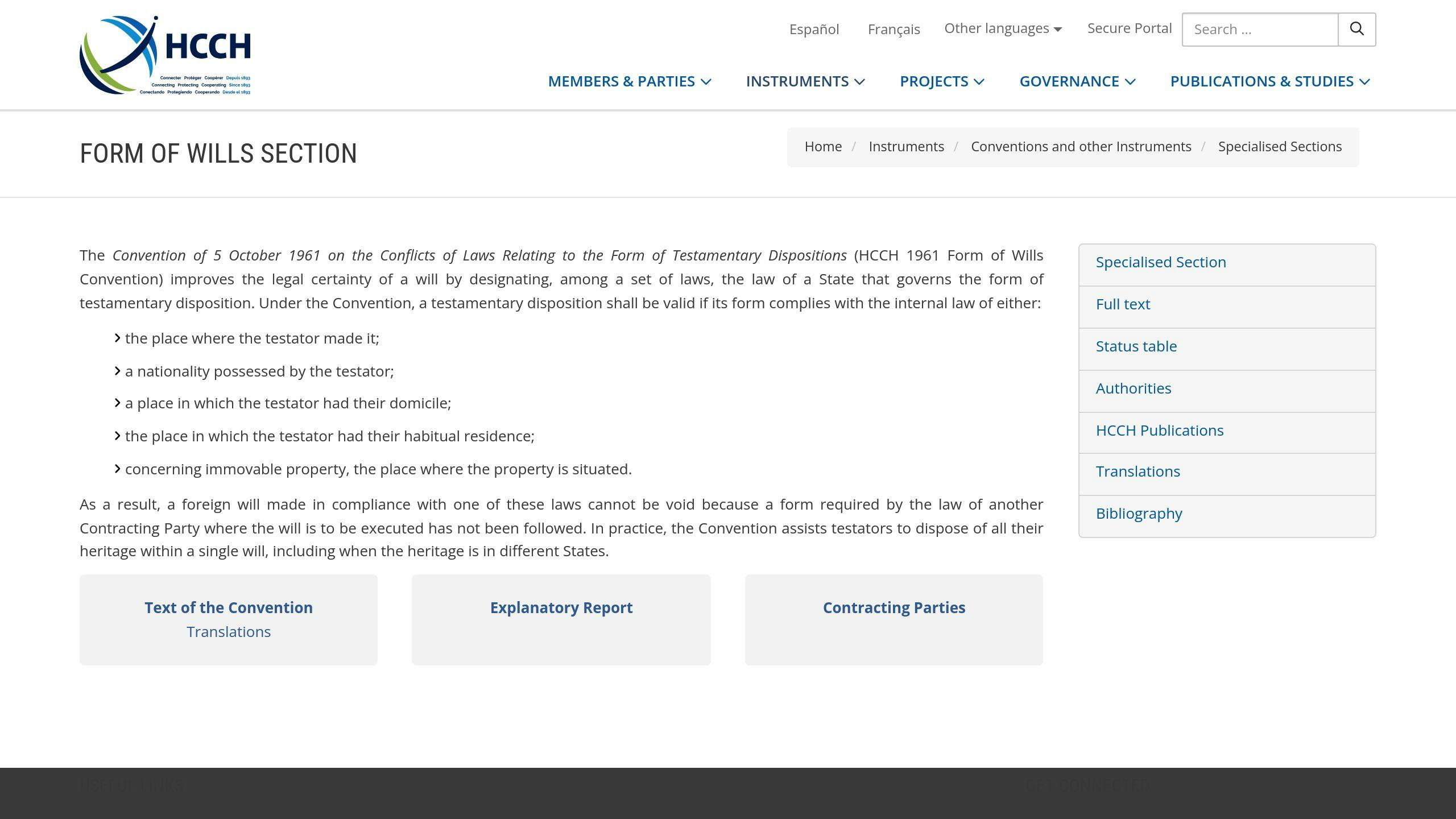: What You Need to Know
Foreign wills can be valid in Spain, but it's not straightforward. Here's what expats and international property owners should know:
- Spain recognizes foreign wills, but validating them is time-consuming and expensive
- Each Spanish region can have different inheritance laws
- EU Succession Regulation allows you to choose your home country's laws, but you must state this in your will
- A Spanish will can help reduce inheritance taxes and simplify the process
Key steps to make a foreign will valid in Spain:
- Get it legalized (apostille for Hague Convention countries)
- Translate it to Spanish using a sworn translator
- Have a Spanish notary validate it
| Will Type | Pros | Cons |
|---|---|---|
| Foreign only | Familiar format | Long validation, possible misunderstandings |
| Spanish | Faster process, clearer wishes | May need to create multiple wills |
Bottom line: While foreign wills can work in Spain, creating a Spanish will for your Spanish assets is often easier and more efficient in the long run.
Related video from YouTube
Spanish Inheritance Law Basics
Spanish inheritance law is different from what you might be used to. Here's what you need to know:
Common Law vs. Civil Law
Spain uses a civil law system. This means:
| Common Law (UK/US) | Civil Law (Spain) |
|---|---|
| Handwritten wills OK | Wills must be notarized |
| Choose your heirs freely | Forced heirship rules |
| Courts handle probate | Notaries validate wills |
In Spain, notaries are like probate judges. They make sure wills are valid and legal.
Forced Heirship in Spain
Here's the big surprise: You can't just leave everything to whoever you want in Spain.
Forced heirship rules:
- Apply to Spanish nationals and EU residents using Spanish law
- Your estate is split into three parts:
- Legítima (1/3): Must go to legal heirs
- Mejora (1/3): Can favor certain legal heirs
- Libre disposición (1/3): You choose
If you have kids, they MUST get 2/3 of your estate. You only control 1/3.
"I couldn't believe I couldn't leave my Spanish villa to my wife. My kids had to get a big chunk, no matter what I wanted." - British expat
These rules are tricky. Get a lawyer who knows Spanish law and expat needs. Find My Lawyer can help you find an English-speaking expert.
Laws Governing Foreign Wills in Spain
Spain's legal system handles foreign wills through two main frameworks:
EU Succession Regulation (Brussels IV)
Brussels IV shapes how Spain deals with foreign wills:
- Applies to deaths after August 17, 2015
- Lets you pick your nationality's law for your estate
- Without a choice, your last habitual residence's law applies
UK expats in Spain can choose UK law for their estate. But be careful:
"Many expats think their home country's laws automatically apply. They don't unless you say so in your will", says María Gonzalez, a Spanish inheritance lawyer.
Hague Convention on Wills

This convention also impacts foreign wills in Spain:
- Started October 5, 1961
- Aims to make wills valid across countries
- Spain recognizes wills made under laws of:
- The will-making country
- The testator's nationality
- The testator's domicile
So, a US will following US laws can work in Spain.
But there's a catch. Your foreign will might be valid, but using it isn't easy. You'll probably need to:
- Translate the will
- Get it "apostilled" (officially certified)
- Have a Spanish notary validate it
And watch out: Spain's forced heirship rules might still apply, even with a valid foreign will.
| Foreign Wills in Spain: Pros | Foreign Wills in Spain: Cons |
|---|---|
| Can be valid | May need translation |
| Allow law choice | Require apostille |
| Offer flexibility | Might clash with Spanish laws |
Many expats make a Spanish will for Spanish assets, even with a will back home. It's often easier in the long run.
Making Foreign Wills Valid in Spain
Want your foreign will to work in Spain? You'll need to jump through a few hoops. Here's the lowdown:
Formal Requirements
-
Legalization: Get that will authenticated.
- Hague Convention country? Grab an Apostille.
- Not Hague? Your country's foreign affairs dept + Spanish approval.
- Translation: Spanish, please. Official translator only.
- Notarization: Spanish notary's stamp of approval.
"Expats often assume home country laws apply. They don't unless your will says so." - María González, Spanish inheritance lawyer
Legal Requirements
- Follow Spanish legal norms
- Sound mind when making the will
- Proof it's legit in your home country
- Register with Spain's Central Registry of Wills
| Must-Do | What It Means |
|---|---|
| Legalize | Apostille or country-specific process |
| Translate | Official Spanish version |
| Notarize | Spanish notary's okay |
| Comply | Match Spanish laws |
| Register | Get it on the books in Spain |
Pro tip: Making a Spanish will for Spanish assets? Often easier and cheaper in the long run.
UK will for Spanish stuff? Prepare for headaches. You might need extra paperwork like a Declaration of Law.
Thinking Spanish will? Here's the scoop:
- Cost: £750-ish plus VAT for a basic one
- Process: Sign with a Spanish notary, they keep it and register it
Heads up: Spanish inheritance laws are a whole different ball game. Get expert advice to avoid surprises.
Need help? Find My Lawyer can hook you up with English-speaking Spanish lawyers who know inheritance law inside out. They'll guide you through validating your foreign will or crafting a Spanish one.
Legalizing Foreign Wills in Spain
Want your foreign will to work in Spain? Here's what you need to do:
Apostille and Legalization
First, make your will official for Spain:
- Hague Convention countries: Get an apostille (a special stamp).
- Non-Hague countries: Go through a more complex process.
For US wills:
1. Notarize it
2. Get an apostille from your state's Secretary of State
3. If needed, get authentication from the U.S. Department of State
4. Get legalization from the Spanish Embassy
"The Hague Apostille makes things easier for 133 countries", says María Fernández, a Spanish inheritance lawyer. "It cuts out a lot of red tape."
Translation
Your will needs to be in Spanish. Here's how:
- Get a sworn translation (traducción jurada)
- Only use translators certified by Spain's Foreign Affairs Ministry
- The translation must include the translator's details, affidavit, and more
| Document Type | Cost (per page) |
|---|---|
| Simple personal docs | From 32,50 € |
| Complex materials | Up to 55,25 € |
Tip: Translate before getting the apostille. It's easier.
This isn't just paperwork. It's about making sure Spain respects your wishes. Do it right.
Need help? Find My Lawyer can connect you with English-speaking Spanish lawyers who know inheritance law. They'll guide you through the process.
sbb-itb-c1c0fc4
Managing Multiple Wills
Having assets in different countries? Here's how to handle multiple wills:
Canceling Old Wills
Old wills can cause legal issues. Here's what to do:
- Be clear: In new wills, say if they cancel all old ones or just cover certain assets.
- Mention countries: State which country's laws apply to each will.
- Keep a list: Track all your wills and where they are.
- Update often: Change your wills when your situation changes.
"A new will usually cancels the old one unless you say the old one should stay valid", says Carlos Baos, a Spanish lawyer.
Important: Spanish Civil Code Article 739 says a new valid will cancels an old one unless you say otherwise.
Quick guide to multiple wills:
| Will Type | What It Does |
|---|---|
| "Worldwide" will | Covers your whole estate |
| Local wills | Handle specific assets in each country |
| Asset-specific wills | Cover certain things you own |
Don't DIY: Get a good lawyer to write your wills. It's too important to mess up.
Need help with Spanish inheritance law? Find My Lawyer can connect you with English-speaking experts.
Making Your Foreign Will Valid in Spain
Getting Legal Advice
You need expert legal help to make your foreign will valid in Spain. Why? Spanish inheritance law is tricky. It has forced heirship rules. Plus, common law and civil law systems can clash.
Get lawyers in both countries. This way, your will follows all the rules.
Need help? Find My Lawyer can connect you with English-speaking Spanish lawyers who know inheritance law inside and out.
Writing and Signing Your Will
When you're drafting your will for Spain:
1. Say which country's laws apply: Be clear about this for your Spanish assets.
2. Know about forced heirship: Spanish law says certain relatives MUST get a piece of your estate.
3. Get the right witnesses: For open and closed wills, you need two witnesses who aren't close family.
4. Register it: All wills go to the Central Registry of Wills in Spain.
| Will Type | What You Need |
|---|---|
| Open Will | Notary, two witnesses |
| Closed Will | Sealed envelope to notary, two witnesses |
| Handwritten Will | Just write, date, and sign it yourself |
Remember: You've got six months after death to process an inheritance in Spain.
"At Savloir, we're inheritance law experts. We'll help you manage your assets and make things easier for your heirs." - Joaquín Pons, Spanish inheritance lawyer
After you write your will:
- Get it legalized (apostille for Hague Convention countries)
- Get a sworn translator to translate it
- Hand it over to Spanish authorities
Other Options for Expats
Expats in Spain have more ways to plan their estate beyond validating foreign wills. Let's look at two key options:
Making a Spanish Will
Creating a Spanish will for your assets in Spain can make things easier:
- It's clear about what you want to happen with your Spanish assets
- It can speed up the inheritance process
- It might save your heirs money on legal fees
To make a Spanish will:
1. Talk to a Spanish lawyer
They'll help you follow Spanish inheritance laws.
2. Sign it with a Notary
This makes your will official in Spain.
3. Register it
Make sure it's in the Registry of Last Wills in Madrid.
"A Spanish will can save your beneficiaries time, money, and stress when dealing with your estate in Spain." - Spanish legal expert
Using International Will Formats
International will formats can help if you have assets in different countries:
- EU Succession Regulation (Brussels IV): Lets you choose your home country's laws for your estate
- Hague Convention on Wills: Creates a standard will format that many countries recognize
| Format | Main Benefit | Best For |
|---|---|---|
| EU Succession Regulation | Avoid forced inheritance rules | EU residents with assets in multiple EU countries |
| Hague Convention Will | Widely accepted format | People with assets in countries that signed the Hague Convention |
When using these formats:
- Talk to lawyers who know about international estate planning
- Update your will when your situation changes
- Think about how taxes might be different in various countries
Conclusion
Dealing with foreign wills in Spain? It's tricky, but important. Here's what you need to know:
Spain accepts wills from other countries, but they must be legalized. This means:
- Getting an Apostille (for Hague Convention countries)
- Going through national and Spanish approval (for others)
- Translating it into Spanish
While you don't have to, making a Spanish will for your Spanish assets can make things easier. It simplifies inheritance and helps your beneficiaries.
Here's a quick look at costs:
| Service | Cost Range |
|---|---|
| Basic Spanish will | 60€ - 80€ |
| Will-making advice | 150€ - 250€ |
| Estate distribution | 1500€ |
Talk to a Spanish lawyer who knows cross-border succession. They'll help with Spanish laws, conflicts between countries, and taxes for heirs.
EU citizens living in Spain can choose their home country's laws for inheritance. And Spanish wills are kept in a central registry in Madrid.
Don't ignore this. Each year, about 100 million euros in Spain go unclaimed due to inheritance issues. Plan now to save your heirs headaches later.
"Make a Spanish will if you own assets in Spain. It'll make things easier for your beneficiaries when you're gone." - E&G Solicitors in Spain
FAQs
Are US wills valid in Spain?
Yes, US wills can work in Spain. But there's a catch: they need to meet some specific rules.
Here's what you need to do:
- Get it legalized (or apostilled)
- Translate it to Spanish
- Make sure it follows Spanish inheritance laws
"Foreign wills are valid in Spain, but interpreting them can be tricky." - Spanish legal expert
To use your US will in Spain:
- Go through probate in the US
- Get copies of the probate decree and death certificate
- Get these apostilled
- Translate everything to Spanish
Heads up: Heirs need an NIE number if the will isn't Spanish.
| Step | Time | Cost |
|---|---|---|
| US Probate | 6-9 months | $3,000 - $15,000 |
| Apostille | 2-3 weeks | $50 - $100 per document |
| Translation | 1-2 weeks | €30 - €50 per page |
| Spanish Notary | 1-2 weeks | €200 - €500 |
Using a US will is possible, but making a Spanish will for Spanish assets is often easier. Why? It:
- Makes inheritance simpler
- Follows Spanish rules
- Avoids misunderstandings
Living in Spain? Talk to a lawyer who knows about cross-border inheritance. They can help you navigate Spanish inheritance laws and make the best choice for your situation.


